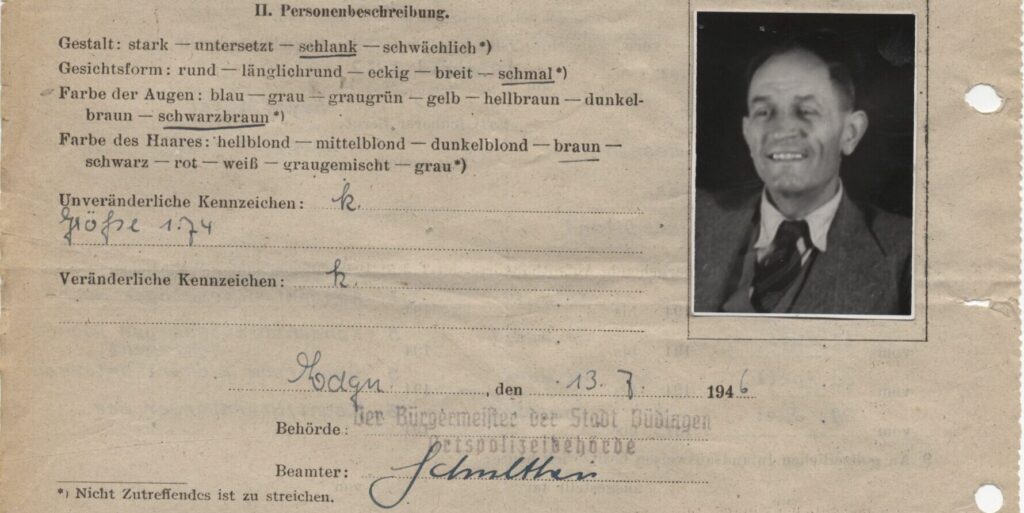
Registration form for police registration and the issuance of a German identity card for Martin Niemöller, 1946 (Hessian State Archives Darmstadt H 3 Büdingen No. 204118) via Wikimedia Commons
There’s a quote by Martin Niemöller that people often misunderstand because they lack some important context.
First they came for the socialists, and I did not speak out—because I was not a socialist.
Then they came for the trade unionists, and I did not speak out—because I was not a trade unionist.
Then they came for the Jews, and I did not speak out—because I was not a Jew.
Then they came for me—and there was no one left to speak for me.
And the story people tell themselves is that he stood by and watched those things happen and merely remained silent. But that’s not what happened, and certainly not what he intended to get across when he used that quote in speeches he gave afterwards. Let me quote from the US National Holocaust Museum:
Niemöller was a fervent nationalist and anti-communist. He was devastated by Germany’s defeat in World War I and the collapse of the German Empire. He also strongly opposed the new postwar German government called the Weimar Republic (1918–1933). Unwilling to serve the new government, Niemöller resigned from the Navy in 1919.
In 1920, Niemöller began seminary training at the University of Münster. He was ordained as a Lutheran pastor in 1924. During the 1920s and early 1930s, he participated in right-wing and antisemitic political parties and organizations.
In keeping with his right-wing, antisemitic outlook, Niemöller enthusiastically welcomed the Nazi regime in 1933. He voted for the Nazi Party in March of that year.
Do you know why he eventually objected to the Nazis? It’s because they started interfering in his church in 1934 and tried to rewrite things to make Jesus Aryan instead of Jewish, and other changes to make Christianity ‘less Jewish’. That’s it. He didn’t have a problem with anything else happening before 1934, it was entirely the meddling in the church. At that point, he became outspoken, got arrested, ended up in a concentration camp. The quote isn’t wrong, it was repeatedly used as part of a speech he gave where he talked about all this. But we’ve lost the context and just know the quote.
tl;dr – ‘First they came for’ is about Niemöller explaining how he voted and campaigned for the face-eating leopard party, didn’t notice warning signs, and then had his face eaten. He had a whole speech about it.
However, I want to talk about a different problem besides that common misunderstanding. The problem is that the quote starts 15 years too late with the Nazis coming for their main political enemies, the socialists or communists or whatever version of the quote you get.
That wasn’t the start. The situation, the ideology, started about 10-15 years earlier.
Rewind to 1918, the end of WWI. Before the Nazis, there were the Völkisch. That was a sort of reactionary rural nationalism that had all sorts of…weird ideas. It is essentially where the concept of ‘blood and soil’ comes from (which I don’t want to get into but feel free to Google), and has this mythological idea of rural folks fighting modernity.
Now, I want to be clear here: Völkisch was an extremely broad ideology. So when I say the Völkisch did something, I don’t mean everyone who called themselves Völkisch was doing that, or even agreed with it. There were parts of Völkisch that were just goofy back-to-nature things, or honest neopaganism, or even nudism, apparently. I’m generalizing.
But Völkisch ended up being part of what was eventually called the German neoconservative movement. A very important part, because it lead to the secretive Thule Society, who helped found the German Worker’s Party, which eventually became the National Socialist German Workers’ Party. There’s other stuff that ended up in the Nazis also, like the Freikorps, but Völkisch beliefs formed a major core of the ideology, the ‘blood and soil’ that distinguished true German ‘volk’ from everyone else.
So what were the Völkisch doing, before the Nazis took over in 1933 and came for the socialists?
These proto-facsists were identifying Jews at the main problem of society, just like the Nazis did later. Everything was the fault of people who were not part of the German ‘volk’, and Jews were almost the definition of people who were not ‘volk’.
They also formed angry mobs. But those mobs didn’t attack Jews, as far as anyone can tell. Now I want to make it clear that this is distinct from the other political violence happening during some of this, the far-right violence and assassinations from the Freikorps that existed from the end of WWI to 1922, which did target a lot of Jews, and Marxists, for that matter. Mostly in the government. Those were the cold politically calculated murders of political opponents, and while those groups did eventually merge with the Völkisch into the Nazis, it was Völkisch thought that lead to actual Nazi ideology. And that ideology starts with the angry mobs. Without them, it’s just the far-right, not Nazis.
There were incidents of violence, by these Völkisch mobs, against two groups. These two groups that they literally first ‘come for’, Niemöller didn’t mention at all. Probably because society’s opinion of those groups hadn’t changed by the end of the war, so he didn’t consider it might have been a mistake. Indeed, people cared so little about these groups that these attacks are very poorly documented, which obviously wasn’t helped by the Nazis destruction of history once they came to power.
The first of two groups the Völkisch attacked were feminists. And generally women who didn’t conform to societal expectations of women.
Because in addition to hating non-‘volk’, the Völkisch hated independent women. They saw women’s suffrage, which had happened in the Weimar Republican at the very start, to be almost as bad as the Jews. Not quite as bad as Jews, but they couldn’t just attack Jews; they didn’t have the political cover that the far-right Freikorps had. But they could get away with, or at least thought they could get away with, attacking women who were not traditional German women.
The other group? Well, that group was much smaller, and honestly we only have records of one group member that the Völkisch went after, a scientist, Magnus Hirschfeld, although it’s understood they went after others. It was a man was beaten nearly to death in 1920 by the Völkisch, and threatened repeatedly, which ironically turned out good for him because he ended up fleeing the country in November 1930 before the Nazis, which meant the Nazis couldn’t kill him when they attacked his research institution and burn all his books in the first book burning in 1934. This man was Jewish, but just like Jewish feminists, that wasn’t the real reason he was attacked. It was because he was gay, and because his scientific research was about gay and trans people. He was caricatured by the media as a Jewish doctor threatening German youth, and that obviously resulted in violence against him.
But saying it like that misses the forest for the trees. Because those first two groups, the feminists and the gays?
They’re the same group.
The new theory for homosexuality, at the time, was something called inversion theory. It proposed that gay people were, in some sense, slightly accidentally made of the other sex, or even could be understood as some third middle/mixed sex. People were questioning some of the sexual binary for the for the first time. And trans people, whom only Hirschfeld really cared about, were definitely dismantling gender roles. Berlin was a hotbed of this sort of dismantling; Cabaret wasn’t an exaggeration, and it wasn’t just happening in Germany. The 1920s were a weird time for gender. The Völkisch, a very rural movement, saw that sort of ‘urban hedonism’ as the enemy.
Meanwhile, in the other direction: The suffrage/feminist movement, which also was a world-wide thing at this point, was astonishingly queer, despite that being mostly erased from the history books, and part of this erasure was due to the movement itself trying to hide exactly how many of the women involved were lesbians. I can’t even list the amount of very prominent suffragists that were ‘very good friends’ with another woman, who lived with them for decade, and were even in things described as Boston marriages which everyone is very good at pretending were platonic. Here’s a short list: Gail Laughlin, Dr. Mary Austin Sperry, Angelina Weld Grimké, Lucy Diggs Slowe, M. Carey Thomas, Mary Elizabeth Garret, Jane Addams, Mary Rozet Smith, Sophonisba Breckinridge, Marion Talbot, Edith Abbott…
I could just keep listing. I have a dozen names in front of me right me. I have one I could throw out that, if I said it, it would dominate the entire discussion, but that’s not the topic here.
Admittedly, that list is of British and American feminists, not German, because frankly I know very little about German feminism. But here’s the first sentence, trimmed from Wikipedia, talking about Feminists in Weimar Germany: Prominent feminists of this era included Helene Lange, her life partner Gertrud Bäumer, Helene Stöcker, and Clara Zetkin. The first two of those are a lesbian couple. The third one is also a lesbian.
Stepping back for a moment, it’s often noticed that a lot of the very early gay rights movement, pre-1940s, looks like it was mostly about gay men. There’s a variety of reasons for that, some of which are some not-very-great sexism, but part of the reason is that the politically-active lesbians were mostly all over in the suffrage/feminism movement. The gay men were trying to stop laws explicitly targeting homosexuality, and meanwhile lesbians were trying to dismantle laws that made most women, either presumptively or explicitly, under the control of some man, either her father or husband. For obvious reasons.
Both these groups were ripping apart the laws that defined the role of sexes. It’s not multiple movements; it’s one vast blob of people ripping apart gender roles from slightly different directions for slightly different reasons. There’s a whole article there I could write about how entangled feminism and queer rights have always been, because they are both challenging the same thing. But that isn’t the important thing here.
The important thing is that gender roles were so inbuilt into society that people, including Martin Niemöller, didn’t even think of about the fact that the fascists ‘came for’ people who had questioned gender roles and started dismantling them a decade before the fascists were even properly fascists. He sat down and tried to figure out his mistakes, and warn the world, and he totally overlooked this. I’m not really here to criticize him; he did try, but this warning failed, at least a little.
It’s the same way that when we liberated the concentration camps; we freed the socialists, and trade unionists, and the Jews, and the defiant Christians like Niemöller. We put the gay people back in proper jail, where they belonged. And didn’t particularly give more rights to women; we basically reset that to the Weimar Republic. Women could vote again (I’m not sure the Nazis ever bothered to remove that right legally anyway, considering they did not hold elections?) and were now back to being allowed, hypothetically, to attend college, which the Nazis had banned.
So why am I saying all this? It’s to warn people that the canary in the coal mine for fascism ideology isn’t in the quote.
The first step isn’t coming for current political enemies who could win at the ballot box or stop their actions in other legal ways (well, it is, but that’s not where fascist ideology come from, that’s just something that the far-right likes to do in general, so you can’t use that as a warning. It’s always true), it isn’t coming for groups and places where political enemies tend to cluster and form protests, it isn’t coming for whatever out-group is currently the Two Minute Hate target, and it isn’t coming for otherwise accepted people that disagree with the government on questions of religious doctrine. Those are all far too late.
What we need to watch for is a proto-fascist movement forming as a reactionary movement. And it will be probably be because state violence (aka, laws) is no longer being practiced against a group. That group has become legal in the last few decades, or gained some rights. The proto-fascists will turn around and use that fact that everyone used to be okay with, that state violence against those people to make them the first target of extra-judicial mob violence. And then later they’ll merge with a more formal far-right, and that will be fascism.
It seems unlikely that the next fascism will be targeting the exact same groups. They won’t go after queer people for muddying gender, or women for any sort of recent political gains. I can’t really imagine a reactionary movement doing that in the modern day, talking about how women have specific roles they have to fulfill and shouldn’t be in positions of authority, or building some elaborate thing about gender roles around LGBTQ people and how they threaten children. No, that would be a little obvious, right? A little on the nose? We’d have to be really inattentive to miss that one, people would be screaming out warnings.
But it will be someone. A group or groups that, until recently, were illegal or legally restricted in some way, have only been legal a couple of decades, and still aren’t well accepted and face a large amount of discrimination. That’s who they will ‘first come for’, because that’s who they can first target outside the law. That happens first; it’ll be a decade or so before they go after any one else.
That’s the point we need to be wary of what’s happening, and start looking for other indications of fascism. Just keep an eye out for it, it could happen at any time, and a decade later we’re shipping some outgroup off to gulags without a trial. Probably not Jews this time…not at first. The Amish? Who knows.
Anyway, thank you for reading my first post, an essay that is entirely about a well-intentioned but slightly wrong quote by Martin Niemöller about the start of fascism and how fascism would hypothetically reappear. And nothing else.



